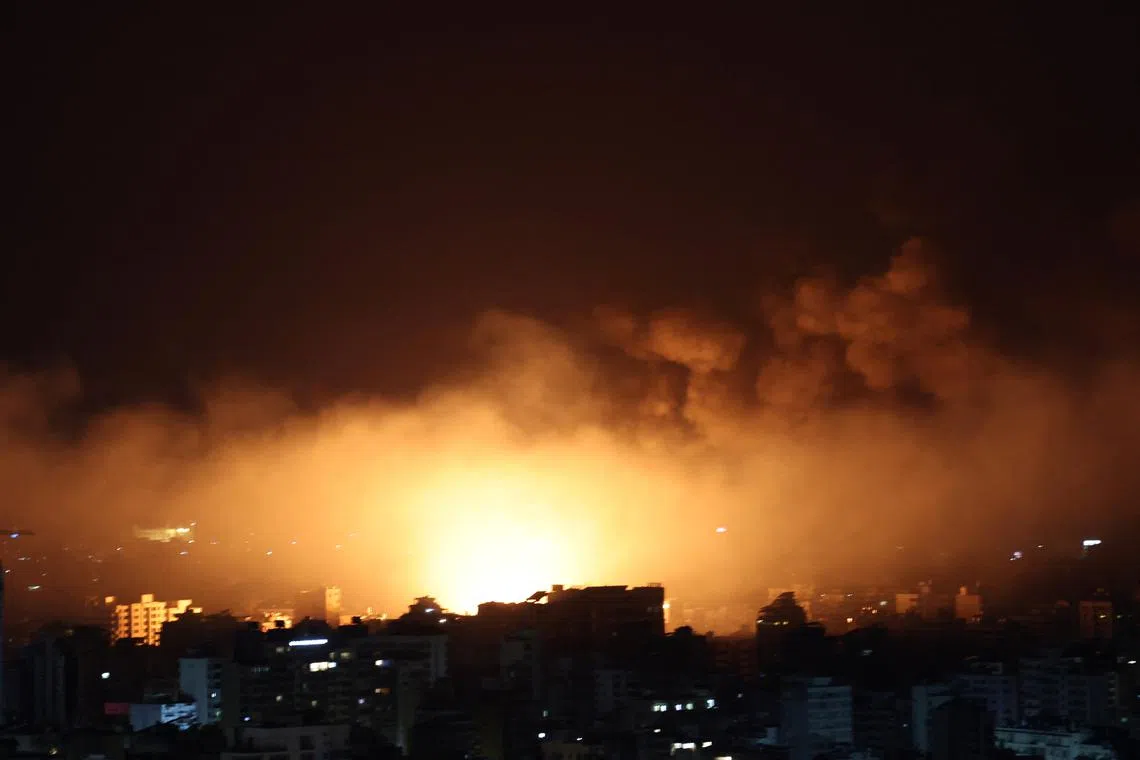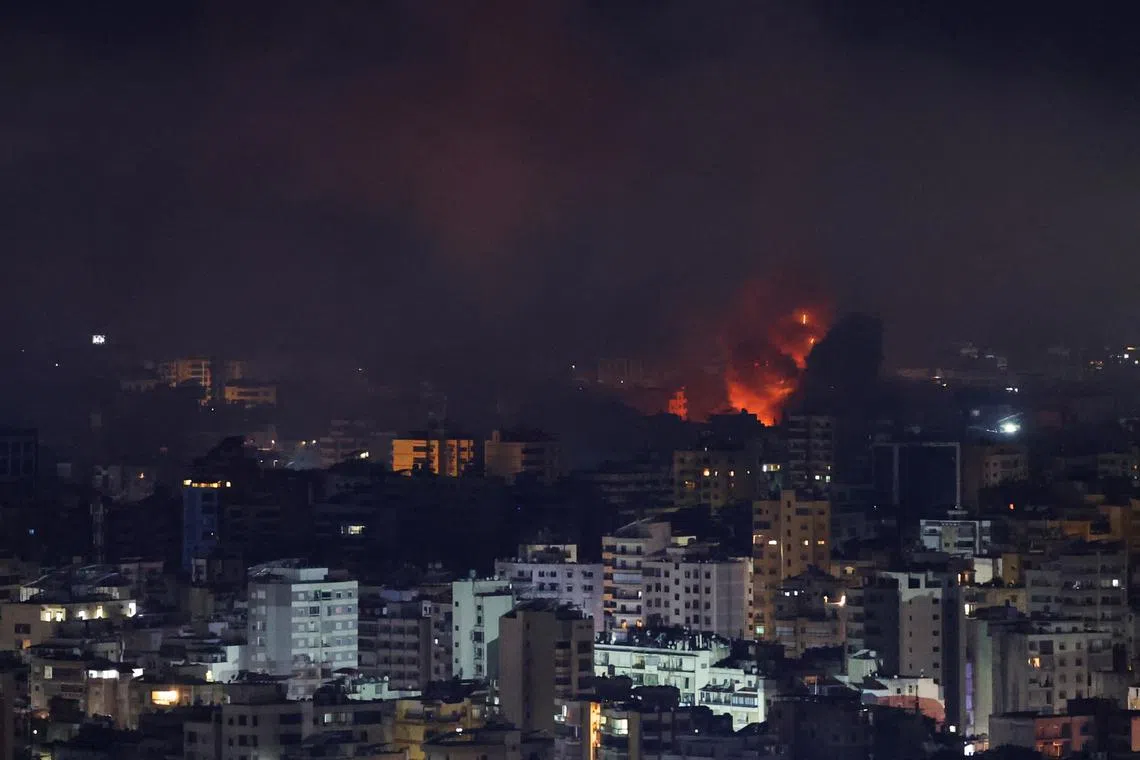Israel orders more evacuations in southern Lebanon; at least 9 killed in Beirut
Sign up now: Get ST's newsletters delivered to your inbox

Fire and smoke rising over Beirut‘s southern suburbs on Oct 3 after a strike, amid ongoing hostilities between Hezbollah and Israeli forces.
PHOTO: REUTERS
Follow topic:
BEIRUT - The Israeli military issued evacuation warnings on Oct 3 for a further swathe of towns and villages in southern Lebanon, where its troops are fighting Hezbollah militants, as Lebanese health officials raised the death toll from an Israeli strike near the heart of Beirut to at least nine people.
No apparent warning preceded the overnight strike, which hit the Bachoura neighbourhood of Beirut, the Lebanese capital, several hundred yards from Parliament and Western embassies.
Other large explosions were heard in or near the city early on Oct 3 as Israel continued its campaign against Hezbollah, including in the Dahiya, a cluster of neighbourhoods on the southern outskirts of Beirut where Hezbollah holds sway.
“Another sleepless night in Beirut. Counting the blasts shaking the city. No warning sirens. Not knowing what is next. Only that uncertainty lies ahead. Anxiety and fear are omnipresent,” UN special coordinator in Lebanon Jeanine Hennis-Plasschaert said on social media platform X.
A Hezbollah-linked civil defence group said seven of its employees, including two medics, were killed in Beirut.
Lebanon’s health minister, meanwhile, said more than 40 rescuers and firefighters were killed by Israeli fire over the previous three days.
The Israeli military, on the other hand, said it hit Hezbollah’s intelligence headquarters in Beirut, “including terror operatives belonging to the unit, intelligence-gathering means, command centres and additional terrorist infrastructure”.
The attack on Beirut followed a day of clashes between Israeli troops and Hezbollah in southern Lebanon, in what appeared to be the first direct confrontations between the two sides since the invasion began.
Israel said eight of its soldiers had been killed, including five members of an elite unit, as its forces engaged in close-range combat
It said it targeted a municipality building in the southern Lebanese town of Bint Jbeil, killing 15 Hezbollah fighters.
Lieutenant-Colonel Avichay Adraee, a spokesman for the Israeli military, warned residents of more than 20 additional towns and cities in southern Lebanon to leave their homes immediately and not to move south towards the Israeli border, a possible sign that the ground invasion which Israeli forces began this week could be expanding.
The areas are farther north than those mentioned in previous Israeli evacuation warnings and include Nabatieh, one of the largest cities in southern Lebanon.
All lie above the Litani River, the upper boundary of a buffer area established by the UN after the 2006 war between Israel and Hezbollah.
Sabre-rattling and war drums
Israeli leaders were continuing to weigh a military response to Iran.
Iran launched its largest-ever assault on Israel
Tehran said its attack was over, barring further provocation, but Israel and the US have promised to hit back hard.
Israeli Prime Minister Benjamin Netanyahu, who has vowed retribution
Iranian President Masoud Pezeshkian, speaking at an event in Doha, said Iran would be ready to respond, and warned against “silence” in the face of Israel’s “warmongering”.
“Any type of military attack, terrorist act or crossing our red lines will be met with a decisive response by our armed forces,” he said.
Qatar’s Emir Sheikh Tamim Hamad Al Thani called for serious ceasefire efforts to stop Israel’s “aggression” in Lebanon, and said no peace was possible in the Middle East without the creation of a Palestinian state.
What is happening in the Middle East is a “collective genocide”, he said at the same Doha event, adding that his country has always warned of Israel’s “impunity”.
Iran’s Foreign Ministry spokesman Esmaeil Baghaei dismissed the Group of Seven’s (G-7) condemnation of Iran’s attack on Israel as “biased and irresponsible”.
In a statement on Oct 2, G-7 leaders expressed “strong concern” over the crisis in the Middle East but held out a diplomatic solution, saying a regionwide conflict was in no one’s interest.
Mr Baghaei blamed the US, in particular, for destabilising the region by “increasing insecurity and instability in West Asia due to their armament, (and) financial and political support” of Israel.
Tehran summoned the German and Austrian ambassadors on Oct 3.
“We believe that if European states had taken effective and practical measures on time, including cutting off financial and weapons support, they would have cut short the killing and genocidal machine of the Zionist regime (Israel) by today, and we would not have witnessed such tragedies,” the ministry said.
Hauling out of the Mid-East
Nations in the Asia-Pacific are rushing to evacuate thousands of their citizens and other residents
Officials from nations like the Philippines, Indonesia and Australia said on Oct 2 that they were working to secure chartered flights to bring their people home while Beirut airport remains open.
The Philippine government is chartering flights for more than 1,200 out of 11,000 Filipinos who sought to be repatriated from Lebanon.
Singapore’s Ministry of Foreign Affairs has advised its citizens in Lebanon to leave the country immediately via commercial options.
“In view of the volatile situation in the region, Singaporeans are advised to defer all travel to Lebanon,” it said in an updated travel advisory on Sept 28.
Indonesia has also begun evacuating its citizens from Lebanon, with its embassy in Beirut so far facilitating the return of at least 25 Indonesians since August.
More than 1,900 people have been killed and over 9,000 wounded in Lebanon in almost a year of cross-border fighting, with most of the deaths occurring in the past two weeks, according to Lebanese government statistics.
Caretaker Prime Minister Najib Mikati said about 1.2 million Lebanese have been displaced by Israeli attacks.

Fire and smoke rising over Beirut’s southern suburbs after a strike, amid hostilities between Hezbollah and Israeli forces, as seen from Sin El Fil, Lebanon, on Oct 3.
PHOTO: REUTERS
Sheltering inside a nightclub
More than 300 of those displaced have taken shelter in a Beirut nightclub, once known for hosting glitzy parties and where staff are now using their guest-list clipboards to register residents.
“We are trying to keep strong,” said Ms Gaelle Irani, who was formally in charge of guest relations, taking a brief break from finding people a corner to live in.
“It is just overwhelming. So overwhelming and sad. But just as this was a place for people to come enjoy themselves, it is now a place to shelter people, and we are doing everything we can to help and be there for them.” NYTIMES, REUTERS

